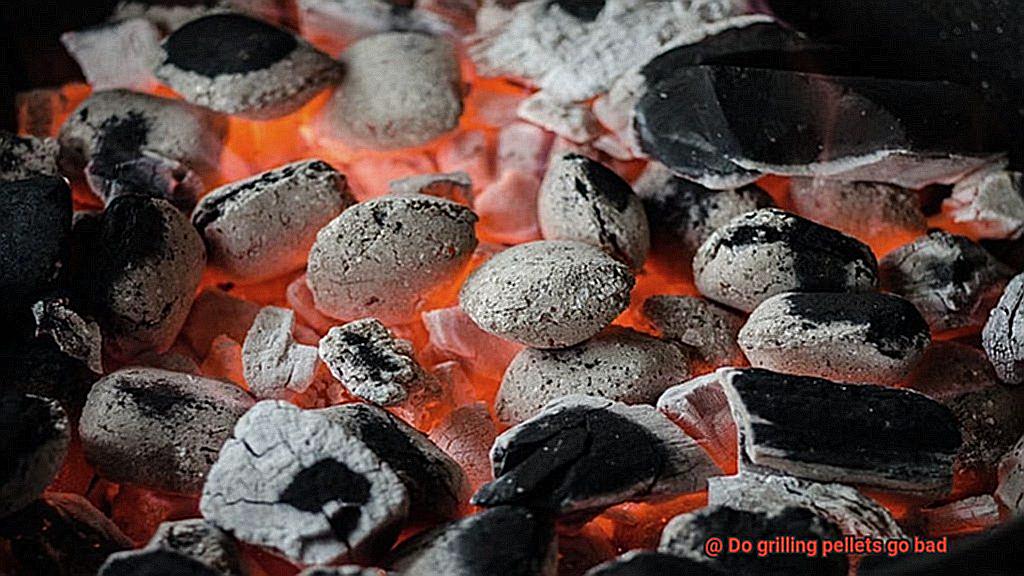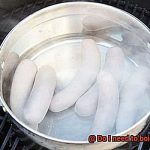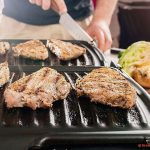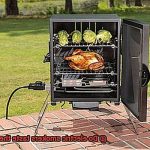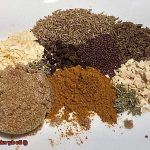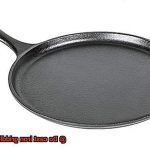Are you a fan of mouthwatering, smoky grilled meats and veggies? If so, then you know that the type of pellet fuel you use can make or break your grilling experience. But what happens when you’ve had a bag of grilling pellets collecting dust in your garage for months or even years? The big question is, do grilling pellets go bad, and if yes, what does that mean for your next cookout?
Well, the answer is simple – Yes. Grilling pellets can go bad over time due to exposure to air and moisture. This can cause them to lose their flavor and quality. However, don’t fret just yet. Proper storage techniques can help extend the lifespan of your pellets and keep them fresh for months or even years.
In this blog post, we’ll dive into all the factors that affect the shelf life of grilling pellets. We’ll explore everything from the types of wood used to storage methods and signs that indicate your pellets have gone bad. Additionally, we’ll provide some practical tips on how to store your pellets correctly so that you can continue enjoying those delicious smoky flavors at every cookout.
Whether you’re an experienced grill master or just starting with pellet grilling, this post has got you covered. So sit back, relax, and let’s learn everything there is to know about whether or not grilling pellets go bad.
Contents
What are Grilling Pellets?
If you’re looking to elevate your outdoor cooking game, grilling pellets are the way to go. These small, cylindrical pieces of wood or other organic materials are compressed under high pressure and designed to burn cleanly and evenly, producing a consistent heat source for grilling, smoking, and barbecuing.
Grilling pellets come in a variety of flavors, each with its distinct aroma and taste. From the bold flavors of hickory and mesquite to the sweet and fruity notes of apple and cherry, there’s a pellet for every palate. The pellets range in size from 1/4 inch to 1/2 inch in diameter and 1 inch to 1 1/2 inches in length, making them easy to handle and use.
One of the biggest advantages of using grilling pellets is their convenience. Unlike traditional charcoal or wood-fueled grills that require constant attention and monitoring, pellet grills can be programmed to maintain a consistent temperature for hours without needing to be refueled. Plus, the pre-packaged bags make them easy to store and transport, perfect for camping trips or tailgating parties.
But how do they work? Grilling pellets are fed into a hopper on your pellet grill, which then feeds the pellets into a combustion chamber where they are ignited by a heating element. As the pellets burn, they produce smoke and heat, which are then circulated throughout the grill by a fan. This results in a consistent heat source that allows you to cook your food evenly every time.
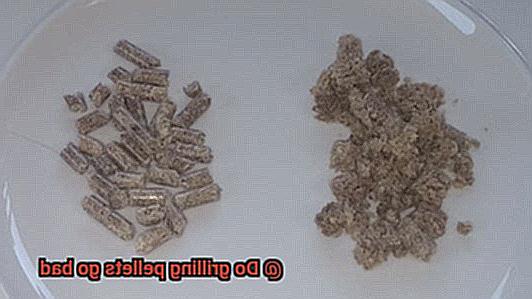
To keep your grilling pellets fresh, it’s important to store them properly. The pellets need to be protected from moisture and humidity as they can absorb it and become unusable. It is recommended that grilling pellets be stored in airtight containers in a cool, dry place. This will help prevent moisture from getting in and keep the pellets fresh for longer. Additionally, avoid storing them in direct sunlight or near sources of heat, such as a grill or stove.
How Long Do Grilling Pellets Last?
Grilling pellets have a “best by” date, which means they may still be usable after that date has passed, but their quality and effectiveness may have diminished. The lifespan of grilling pellets can vary depending on factors such as storage conditions and the type of wood used to make the pellets. Proper storage involves keeping the pellets in a dry, cool place away from moisture and direct sunlight. Generally speaking, most grilling pellets can last anywhere from six months to one year if stored properly.
But how do you know if your grilling pellets have gone bad? One way is to give them a sniff test. If they have a musty or moldy smell, it’s time to toss them out. Another way is to check for discoloration or the development of a film of dust or mold.
It’s essential to keep in mind the shelf life of grilling pellets when purchasing them during sales or promotions. It’s best to only buy the number of pellets you think you’ll use within a six-month to one-year period. By doing so, you’ll avoid wasting money on pellets that have gone bad.
Proper Storage of Grilling Pellets
After all, using pellets that have gone bad due to improper storage can ruin your grilling experience. Therefore, let’s delve into the crucial dos and don’ts of storing your grilling pellets.
Firstly, keep your pellets dry at all times. This means storing them in a cool, dry area away from moisture and humidity. When exposed to moisture, the pellets can swell or fall apart, making them unsuitable for grilling. So, refrain from storing them outside on a rainy day or in a damp basement. Instead, opt for a dry storage area like a garage or pantry.
In addition to keeping the pellets dry, ensure that they are away from direct sunlight. The UV rays can cause the pellets to break down and lose their flavor over time. Thus, avoid leaving them out on a sunny patio or near a window. Instead, store them in a dark, shaded area like a closet or cabinet.
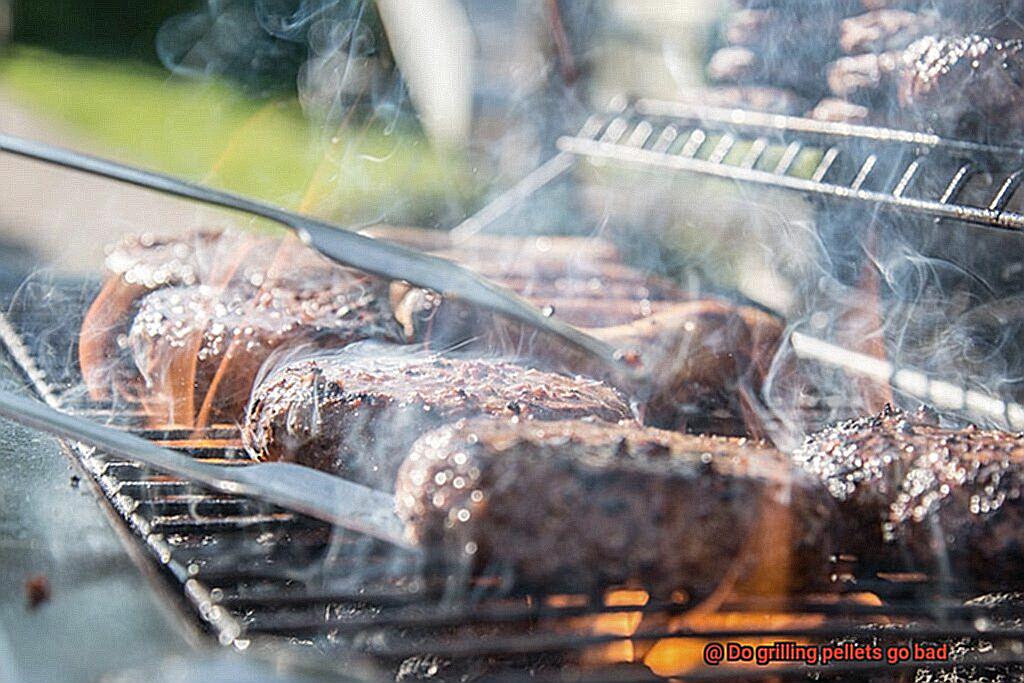
Another vital factor for proper storage is an airtight container or bag that can prevent exposure to oxygen. Oxygen can cause the pellets to oxidize and lose their flavor over time. Vacuum-sealed bags or containers are highly recommended since they remove any air inside and keep the pellets fresher for longer periods.
Lastly, it is crucial to store your grilling pellets away from other chemicals or substances with strong smells. Pellets can easily absorb odors that can affect their taste and overall performance during grilling. Hence, avoid storing them near your cleaning supplies or any other strong-smelling items.
Avoiding Moisture and Humidity
As a true grill master, you know that achieving that perfect smoky flavor requires the use of high-quality grilling pellets. But did you know that moisture and humidity can quickly ruin those pellets, leaving you with subpar results? Fear not, because I am here to share my expert tips on how to avoid moisture and humidity when storing your grilling pellets.
The first step in preserving your pellets is to store them in a dry, cool place, away from any sources of moisture or humidity. A garage or storage shed is ideal for this purpose, but make sure to avoid damp basements or leaving them outside in the rain.
To go the extra mile in protecting your pellets, consider using an airtight container for storage. This will not only keep them dry but also prevent any odors or flavors from being absorbed by the pellets. Look for a plastic or metal container with a tight-fitting lid for optimal results.
Another excellent option is to use a dehumidifier in the area where your pellets are stored. This device helps remove excess moisture from the air, which can keep your pellets dry and prevent them from breaking down. Plus, it can also benefit other items stored in the same area.
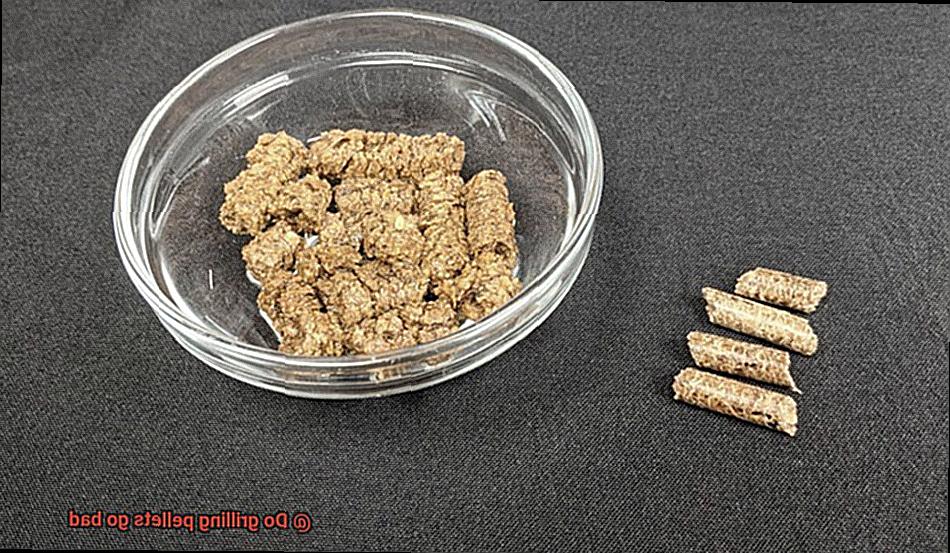
Storing Away from Heat Sources
Don’t let your hard-earned money go to waste. Properly storing your pellets away from heat sources is crucial in ensuring their quality and longevity. Let’s dive into some expert tips on how to do just that.
Firstly, heat is the enemy of grilling pellets. Heat can cause the natural oils in the pellets to release, leading to spoilage and subpar results. To avoid this, ensure that your pellets are stored in a cool and dry place. A garage or shed can be a great option as long as it isn’t exposed to direct sunlight or any other sources of heat.
Secondly, moisture is another villain of grilling pellets. It can cause the pellets to swell and break down, making them unusable. To ensure your pellets stay dry and fresh, store them in their original packaging or in an airtight container. This will prevent moisture from seeping in.
Lastly, if you live in a region with high humidity, consider using a dehumidifier in your storage space. This will further prevent moisture buildup and keep your pellets in top shape.
Expiration Date of Grilling Pellets
As grilling pellets gain popularity among backyard grillers and professional pitmasters, it’s important to know whether they can go bad. And the answer is yes – grilling pellets can expire and lose their effectiveness over time. But how do you determine their expiration date, and why is it vital to consider when purchasing and using them? As an expert in this area, let me break it down for you.
Firstly, the expiration date of grilling pellets is usually printed on the bag. While it’s not a hard and fast rule, most manufacturers suggest that pellets should be used within six months to a year of the production date. The date is a guideline for maximum freshness and effectiveness.
However, several factors can affect the expiration date of grilling pellets, including exposure to moisture, sunlight, and air. Pellets that have been exposed to these elements for an extended period may not perform as well as fresh pellets.
To ensure the freshness of your grilling pellets, proper storage is key. Keep them in a cool, dry place away from direct sunlight and moisture. It’s also recommended to store them in an airtight container or sealable bag to prevent exposure to air. By taking these steps, you can help extend the life of your grilling pellets and get the most out of them.
When purchasing grilling pellets, it’s essential to buy from trusted manufacturers and retailers. This ensures that the pellets are fresh and have not been sitting on a shelf for an extended period. By purchasing from reputable sources, you can feel confident that you are getting high-quality grilling pellets that will perform well on your grill.
It’s important to note that using expired grilling pellets won’t necessarily harm you or your food. However, they may not burn as hot or efficiently as fresh pellets, which could impact the flavor and texture of your food.
Quality and Flavor Deterioration
Unfortunately, various factors can deteriorate the quality and flavor of your pellets over time. Let’s take a closer look at each of these factors and how they can affect your pellets.
Firstly, moisture is one of the most significant factors that can impact the quality of your grilling pellets. When pellets come into contact with moisture, they can lose their structural integrity and become clumpy. This leads to uneven burning, resulting in an unpleasant experience. Additionally, mold or mildew can develop on the pellets, affecting their flavor and safety for consumption. To avoid this, store your pellets in a cool, dry place away from any moisture sources.
Secondly, air exposure can also have a negative impact on the quality and flavor of your grilling pellets. When pellets are exposed to air, they start to oxidize and lose their flavor and aroma. This can result in an off-flavor or odor that makes grilled food less enjoyable. To prevent this from happening, make sure to seal your pellet bag tightly after use and store it in an airtight container if possible.
Lastly, sunlight exposure is another factor that can have a negative impact on the quality of your grilling pellets. Sunlight can cause the pellets to fade in color and lose their vibrancy. This could be a sign that they are no longer fresh and may not provide the same superior grilling experience that fresh pellets offer. Therefore, it’s essential to keep them away from direct sunlight.
cLuOjzORbnY” >
Conclusion
In conclusion, the answer to the question “Do grilling pellets go bad?” is yes. Exposure to air and moisture can cause these pellets to lose their flavor and quality, which can ultimately affect your grilling experience. However, fear not. With proper storage techniques, you can extend the lifespan of your pellets and keep them fresh for months or even years.
Storing your pellets in a cool, dry place away from direct sunlight and moisture is key. Using an airtight container or sealable bag is highly recommended to prevent exposure to air. When purchasing grilling pellets, it’s important to buy from trusted manufacturers and retailers to ensure that the pellets are fresh and haven’t been sitting on a shelf for an extended period.
By following these simple tips, you’ll avoid wasting money on expired grilling pellets while ensuring that every cookout is filled with mouthwatering, smoky flavors. Remember that moisture, air exposure, and sunlight exposure can all impact the quality and flavor of your pellets over time.

